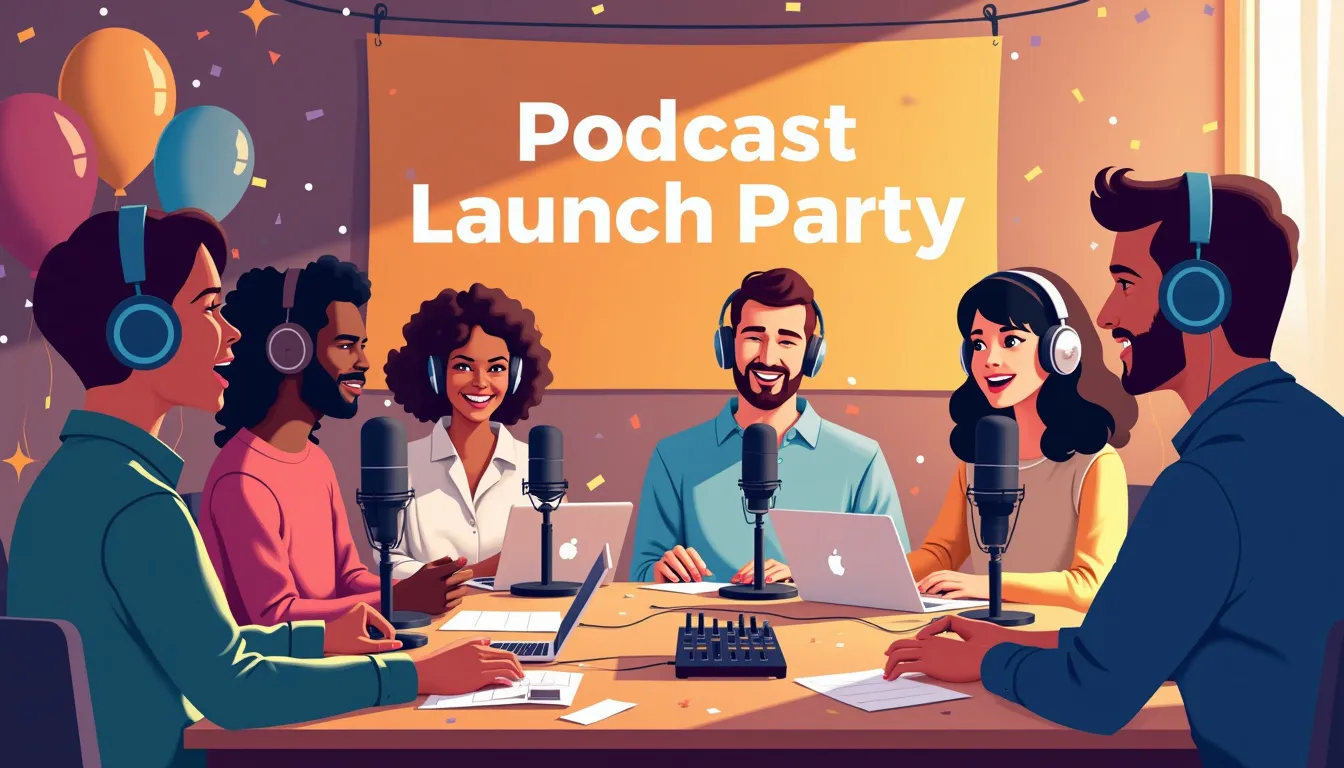In today’s fast-paced digital landscape, podcasts have emerged as a vibrant platform for sharing ideas, stories, and expertise, captivating audiences worldwide. Whether you’re a seasoned professional or a passionate hobbyist, knowing how to start a successful podcast can carve out your unique space in this ever-evolving medium. The allure of podcasting lies not just in its accessibility but also in its potential to build a loyal and engaged audience. But what truly sets a podcast apart in the crowded audio sphere?
The essence of a triumphant podcast lies in its authenticity, consistency, and the value it offers its listeners. Success stems from a blend of meticulous planning, high-quality content creation, and strategic promotion. Throughout this article, we’ll delve into critical steps that fortify your podcasting journey, from identifying your niche and crafting an engaging concept to leveraging social media and SEO for growth.
Reflecting back on my own experiences, juggling the fine details of any project can be daunting, especially when personal challenges like ADHD and OCD come into play. But fear not. With proper strategies and the right tools, you can streamline your process and ensure your podcast resonates with your audience—I’ve harnessed these very tactics in my professional life to manage safety protocols and develop robust AI systems.
We’ll kick off by exploring the foundational aspects of podcast planning, move on to producing high-quality episodes, and wrap up with actionable advice on launching and promoting your podcast effectively. So, if you’re ready to transform your podcasting vision into a resonant reality, let’s dive in!
Importance of Podcasting in Today’s Digital World
In an age where digital content reigns supreme, the podcast medium stands as a beacon of both creativity and connectivity. With an estimated 120 million podcast listeners in the United States alone, starting a successful podcast offers an unparalleled opportunity to reach a vast and engaged audience. Whether you aim to educate, entertain, or build a community, understanding how to start a successful podcast can serve as your gateway to influence and impact.
Podcasts have transcended niche groups and become a mainstream phenomenon, thanks to the convenience of on-demand listening. They cater to all kinds of topics, from true crime and personal development to niche hobbies and professional advice. My journey into podcasting was fueled by my background in safety and AI, coupled with my passion for demystifying these complex subjects. Despite the challenges I’ve faced managing ADHD and OCD, podcasting provided a platform where my voice could resonate and educate with authenticity and expertise. This personal touch is essential when you’re considering how to start a successful podcast.
Overview of What Makes a Podcast Successful
While the definition of success can vary, several key elements are universally accepted as crucial to a podcast’s triumph. Content authenticity, audience connection, and consistent quality stand at the forefront. For example, take the case of the podcast Hardcore History by Dan Carlin. It’s not just the depth of historical knowledge that makes it successful, but Carlin’s ability to craft compelling narratives that engage listeners from start to finish.
Having struggled with OCD, I can attest to the importance of consistency, which is a cornerstone of podcasting success. Consistent scheduling helps in building a loyal listener base who can rely on your content delivery. Moreover, leveraging your unique personal background—like my expertise in AI and safety—adds a layer of credibility and authenticity that listeners truly appreciate.
Another crucial factor is audience interaction. Engaging with your listeners through social media, Q&A sessions, or even live shows fosters a sense of community and belonging. This connection can turn casual listeners into devoted fans. Additionally, high-quality audio production cannot be overstated; poor sound quality is a deal-breaker for many listeners. To provide top-notch audio, investing in the right equipment and learning basic editing techniques is a must.
Brief Mention of Key Steps Covered in the Article
Starting a podcast involves a myriad of steps, each integral to the journey toward success. The subsequent sections of this article will delve into these critical stages in detail:
- Planning and Preparation: Identifying your niche and target audience is fundamental. Crafting a unique concept and format can set you apart from the plethora of existing podcasts.
- Producing High-Quality Content: Excellent scriptwriting, recording, and editing can make your podcast professional and engaging. The strategic incorporation of music and sound effects further enhances the listening experience.
- Launching and Promoting: A well-orchestrated launch plan and effective use of social media and SEO tactics are pivotal for gaining initial traction. Monitoring analytics helps in continuous improvement and growth.
Understanding how to start a successful podcast doesn’t end with just getting your show off the ground. It requires ongoing dedication, adaptability, and a genuine passion for your subject matter. As someone who has navigated various personal challenges, including weight loss and mental health management, I can vouch that persistence is key. Whether you’re aiming to educate on AI safety like I do, or explore entirely different realms, your journey in podcasting can be both rewarding and transformative.

Planning and Preparation for Your Podcast
Identifying Your Niche and Target Audience
Understanding how to start a successful podcast begins with choosing the right niche and defining your target audience. This step sets the foundation for your podcast’s voice, style, and direction. Starting a podcast without a clear niche is like setting off on a journey without a map. Consider your passions, expertise, and the subjects you’re eager to talk about. For instance, if you are a safety expert with a keen interest in artificial intelligence, you could focus on how tech innovations are enhancing workplace safety. Your unique perspective not only carves out a specific niche but also helps you connect with listeners who share your interests.
Similarly, defining your target audience is crucial. You need to know who you’re talking to. Are they professionals looking to upskill, hobbyists seeking entertainment, or perhaps individuals facing personal struggles similar to yours? For example, if you have managed personal challenges such as ADHD or OCD, your shared experiences can resonate deeply with listeners dealing with similar issues. Crafting listener personas can aid in tailoring your content effectively. Imagine your ideal listener’s demographics, interests, and pain points, then address these aspects in your episodes.
Crafting a Unique Podcast Concept and Format
Once you’ve nailed down your niche and audience, the next step in understanding how to start a successful podcast is to design a unique concept and format. Your podcast concept should be something fresh and engaging. Think about shows you enjoy and what makes them stand out. Is it the host’s witty banter, in-depth interviews, or compelling storytelling? Take inspiration but infuse it with your unique style and voice.
The format of your podcast also plays a significant role in keeping your audience hooked. Formats can vary widely—from solo commentary and co-hosted shows to interview-based episodes and narrative storytelling. Choose a format that best fits your niche and feels natural to you. For example, if you excel at dialogue and have a broad network, an interview-based format might be ideal. On the other hand, if you prefer structured episodes with thorough research, a narrative or solo format may be more suitable.
Maintaining a consistent posting schedule is another vital aspect. Consistency not only helps in retaining your audience but also signals reliability and professionalism. Whether you opt for weekly, bi-weekly, or monthly episodes, make sure to stick to your schedule.
Essential Podcasting Equipment Checklist
Good content is crucial, but quality audio can make or break your podcast. Imagine listening to a podcast that is crackling, echoing, or constantly interrupted by background noise—hardly the experience that keeps listeners coming back. Investing in the right equipment is essential for delivering a professional-sounding podcast.
Here is a concise checklist for essential podcasting equipment:
1. Microphone: The heart of your setup. A high-quality microphone can significantly enhance your audio clarity. USB microphones are user-friendly and ideal for beginners, while XLR microphones offer superior sound quality for more advanced setups.
2. Headphones: Critical for monitoring your recordings. Closed-back headphones are preferred as they prevent audio bleed, ensuring you catch and fix any sound issues in real time.
3. Audio Interface: If you opt for an XLR microphone, you’ll need an audio interface to connect your mic to your computer. It transforms analog signals into digital, providing better sound quality and control.
4. Pop Filter: This simple accessory reduces plosive sounds that occur when you pronounce words with ‘p’ and ‘b’. It ensures a cleaner recording, reducing the need for extensive editing.
5. Shock Mount: A shock mount isolates the microphone from vibrations and handling noise, contributing to professional-grade sound quality.
6. Soundproofing Materials: While not a necessity, soundproofing your recording space can enhance audio quality. Foam panels, bass traps, and even DIY solutions like blankets and carpets can minimize echo and background noise.
7. Recording and Editing Software: Tools such as Audacity (free) or Adobe Audition (paid) are excellent for recording, editing, and enhancing your podcast. They offer features like noise reduction, equalization, and multi-track editing to polish your episodes.
Here’s a personal anecdote to illustrate: When I first started, I used a basic USB microphone and recorded in my bedroom. While it worked initially, I quickly realized the limitations—background noise and quality issues plagued my episodes. By investing in an XLR setup with a good pop filter and setting up a mini studio nook with soundproofing foam, the difference was night and day. The professional-quality audio not only improved my listener experience but also boosted my confidence in each episode.
Remember, how to start a successful podcast isn’t just about great ideas and articulating thoughts clearly. It’s also about ensuring your audience enjoys an immersive and professional listening experience. Balancing passion, preparation, and the right tools is your golden ticket to a thriving podcast.

Producing High-Quality Podcast Content
Tips for Excellent Scriptwriting and Storytelling
When learning how to start a successful podcast, scriptwriting and storytelling are fundamental components that can make or break your show. Think of your podcast episodes as mini-productions; without a coherent script or engaging storyline, even the most compelling topic can fall flat.
Start by crafting a detailed outline for each episode. This should include an introduction, main points, and a conclusion. While spontaneity often adds charm, an outline will keep you focused and ensure a smooth flow of content. I recommend scripting out key segments, especially for intricate topics. Imagine trying to explain the intricacies of AI safety without a script; it’s like walking a tightrope without a safety net!
To humanize your content, sprinkle in personal anecdotes or case studies. For instance, when discussing safety protocols in different industries, I often share my experiences from various work environments. This strategy not only provides relatable context but also strengthens your authority on the subject.
Best Practices for Recording and Editing
High-quality audio is the cornerstone of any successful podcast. Poor sound quality can be an immediate turn-off for listeners, so investing in good recording equipment is a must. Yet, the equipment alone won’t guarantee professional-sounding audio; your recording environment and techniques are equally crucial.
When I first started, I made the mistake of recording in a spacious room with hard surfaces. The reverb was appalling. A small, sound-treated space can make a world of difference. Utilize foam panels, carpets, and even heavy curtains to dampen any echo.
Keeping an eye on your recording levels is also vital. I once lost an entire interview episode because I didn’t monitor the input levels, and the audio was distorted beyond repair. Aim for clear, balanced sound where your voice is neither too loud nor too soft.
Editing can transform a good podcast into an exceptional one. Focus on removing filler words (like ‘um,’ ‘uh,’ and ‘you know’) and long pauses, which can detract from the listening experience. Software like Audacity or Adobe Audition can help you refine your audio. Utilize features such as noise reduction and equalization to polish the final product. However, resist the urge to over-edit. A bit of natural flow and an occasional pause can make your content feel authentic rather than robotic.
Incorporating Music and Sound Effects Effectively
Music and sound effects can add depth and dynamism to your episodes, but they must be used judiciously. Think of them as the seasoning in a gourmet dish; just the right amount enhances the flavor, but too much can ruin it.
Choose intro and outro music that aligns with your podcast’s theme and tone. For instance, upbeat and energetic tracks suit lighthearted or motivational podcasts, whereas more subdued tunes fit well with serious or contemplative shows. Ensure that any music you incorporate is either royalty-free or properly licensed to avoid legal issues.
Sound effects can enhance storytelling by creating an immersive audio experience. From the background noise of a bustling city to the subtle chime signaling a segment change, these small audio elements can transport listeners and make your content more engaging. However, overuse can leave your audience bewildered and distracted. For example, while recounting a gripping story about safety breaches, the sudden blare of an alarm can be impactful. But using the same effect repeatedly will quickly lose its impact.
Integrating music or sound effects also brings a level of professionalism to your podcast. I recall a podcast episode where I illustrated a tense situation at a construction site with carefully chosen sounds of machinery and occasional warning signals. The listeners could almost ‘see’ the scene play out, making the content more memorable and impactful.
Speaking from years of experience, balancing technical proficiency and creative flair is the key to producing high-quality podcast content. Whether navigating the challenges of scripting, recording, or editing, these insights can help elevate your podcast to the next level. Remember, it’s a journey filled with lessons from both triumphs and inevitable mishaps. What matters is your commitment to continuous improvement—a mantra that has guided my career and personal endeavors alike.

Launching and Promoting Your Podcast
Launching and promoting your podcast is a pivotal step in building a dedicated listener base and ensuring the longevity of your show. In this section, we’ll cover essential strategies for a successful podcast launch, leveraging social media and SEO effectively, and the importance of monitoring analytics for continuous improvement.
Strategies for a Successful Podcast Launch
PREPARE FOR LAUNCH DAY: Launching your podcast isn’t just about hitting the publish button. Think of your launch as a combination of a premiere and a grand opening. Plan a ‘launch week’ with at least 3-5 episodes ready to go. This gives your listeners a range of content to engage with and allows them to become familiar with your style and subject matter. On launch day, create excitement and anticipation. Share behind-the-scenes content, teasers, and sneak peeks to build up to the release.
USE YOUR NETWORK: Now isn’t the time to be shy. Use your personal and professional networks to spread the word about your new podcast. Reach out to friends, colleagues, and industry connections. Encourage them to listen, subscribe, and share. Word of mouth is powerful and can significantly boost your initial listenership.
CROSS-PROMOTE: Partnering with existing podcasts can also give you a significant boost. Collaborative episodes, guest appearances, or even simple shoutouts can help you tap into an established listener base. Choose podcasts with a similar audience and reach out to them with a clear proposal on how you both can benefit from the collaboration.
Leveraging Social Media and SEO to Gain Listeners
CREATE BUZZ ON SOCIAL MEDIA: Social media platforms are powerful tools for promoting your podcast. Develop a content calendar that aligns with your episode releases. Share compelling visuals, quotes, audiograms, and even behind-the-scenes content regularly. Engaging with your audience through comments and messages increases your podcast’s visibility and builds a loyal community.
UTILIZE SEO STRATEGIES: SEO isn’t just for blogs and websites; it’s essential for podcasting too. Start by optimizing your podcast title and description with relevant keywords such as how to start a successful podcast. Include these keywords in your episode titles and show notes, but ensure they integrate naturally. Transcribing your episodes and posting these transcriptions on your website can also boost your search engine ranking, making it easier for potential listeners to find your content.
SUBMIT YOUR PODCAST TO DIRECTORIES: Ensure your podcast is available on all major podcast directories, including Apple Podcasts, Spotify, Google Podcasts, and Stitcher. Each platform has its own submission process, but being present on multiple directories maximizes your reach.
HAVE A DEDICATED WEBSITE: A podcast website serves as a central hub for your content and allows for better SEO optimization. It also provides a space for additional resources, show notes, and transcriptions. Consider including a blog that dives deeper into episode topics, offers insights, or features guest posts from your podcast guests.
Monitoring Analytics and Continuous Improvement
TRACK LISTENING METRICS: Understanding your audience’s listening habits is crucial for growth. Use podcast hosting platforms that provide detailed analytics on your episodes. Key metrics include the number of downloads, listener demographics, episode drop-off points, and engagement rates. These insights can help you refine your content and release schedule.
LISTEN TO FEEDBACK: Engage with your audience through social media, email newsletters, or dedicated listener surveys. Feedback is invaluable and can highlight strengths and areas for improvement that you might have overlooked. Use this feedback to adjust your content, format, or even marketing strategies.
CONTINUOUSLY IMPROVE: Podcasting, like any other form of content creation, is an evolving process. Stay updated with podcasting trends, attend industry conferences, and regularly review successful podcasts in your niche. Don’t be afraid to experiment with new formats, segments, or promotional tactics. Combining analytics with feedback ensures that your podcast continues to grow and resonate with your audience.
ACHIEVING CONSISTENT GROWTH: Consistency is key. Maintain a regular posting schedule and make sure each episode meets the high-quality standards you set from the beginning. Over time, small improvements and consistent quality will build a loyal listener base.
Launching and promoting your podcast effectively requires strategic planning, leveraging the power of social media and SEO, and a commitment to continuous improvement. By following these steps, you’ll be well on your way to understanding how to start a successful podcast, gaining listeners, and making your mark in the podcasting world. Building a successful podcast is a journey, not a sprint, but with dedication and the right strategies, you can create compelling content that entertains, educates, and inspires your audience.
In conclusion, embarking on the journey of creating a successful podcast is an endeavor that blends creativity, strategy, and persistence. As we’ve explored, the significance of podcasting in our digital age cannot be overstated; it offers a unique platform to connect with a global audience, share valuable insights, and build a dedicated community around your niche.
Starting with meticulous planning and preparation is crucial. Identifying a clear niche and understanding your target audience ensures that your content is relevant and engaging. Crafting a unique concept and format will set your podcast apart, while investing in the right equipment will lay the groundwork for professional-sounding episodes.
Producing high-quality content is where the magic truly happens. Excellent scriptwriting and storytelling captivate listeners and keep them coming back for more. Mastering best practices for recording and editing not only elevates the listening experience but also reflects your commitment to quality. Don’t underestimate the power of well-chosen music and sound effects—they can enhance your narrative and add depth to your episodes.
When it comes to launching and promoting your podcast, a strategic approach is paramount. A well-executed launch can generate buzz and attract a strong initial listener base. Leveraging social media and optimizing for SEO will extend your reach, bringing your podcast to the attention of potential listeners. Continuously monitoring analytics and being open to feedback will help you refine your content and grow your audience over time.
Remember, consistency and passion are the cornerstones of sustained podcast success. While technical know-how and strategic promotion are vital, it’s your authentic voice and dedication that will truly resonate with your audience. So, take the plunge, stay persistent, and enjoy the rewarding journey of podcasting. The airwaves are waiting for your story.
Support Us: Check out our recommended products on Amazon.

